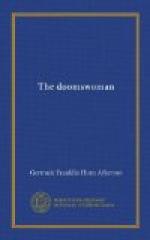She had endeavored to interrupt him once or twice, and did so now, her eyes flashing. “Are you an atheist?” she demanded, abruptly. “Are you not a Catholic?”
“I am neither an atheist nor a Catholic. The question of religion has no interest for me whatever. I wish it had none for you.”
She looked at him sternly. For a moment I thought the Doomswoman would annihilate the renegade. But her face softened suddenly. “I will pray for you,” she said, and turned to the man at her right.
Estenega’s face turned the chalky hue I always dreaded, and he bent his lips to her ear.
“Pray for me many times a day; and at other times recall what I said about the relative value of possible and improbable heavens. You are a woman who thinks.”
“Don Diego,” exclaimed Valencia, unable to control her impatience longer, and turning sharply from the caballero who was talking to her in a fiery undertone, “thou hast not spoken to me for ten minutes.”
“For ten hours, senorita. Thou hast treated me with the scorn and indifference of one weary of homage.”
She blushed with gratification. “It is thou who hast forgotten me.”
“Would that I could!”
“Dost thou wish to?”
“When I am away from thee, or thou talkest to other men,—sure.”
“It is thy fault if I talk to other men.”
“You make me feel the Good Samaritan.”
“But I care not to talk to them.”
“Thy heart is a comb of honey, senorita. On my knees I accept the little morsel the queen bee—thy swift messenger—brings me. Truly, never was sweet so sweetly sweet.”
“It is thou who hast the honey on thy tongue, although I fear there may be a stone in thy heart.”
“Ah! Why? No stone could sit so lightly in my breast as my heart when those red lips smile to me.”
Chonita listened to this conversation with mingled amazement and anger. She did not doubt Estenega’s sincerity to herself; neither did Valencia appear to doubt him. But his present levity was manifest to her. Why should he care to talk so to another woman? How strange were men! She gave up the problem.
After the long banquet concluded, the cavalcade formed once more, and we returned to the town. Prudencia rode her white horse alone this time, her husband beside her. Leading the cavalcade was the Presidio band. Its members wore red jackets trimmed with yellow cord, Turkish trousers of white wool, and red Polish caps. With their music mingled the regular detonations of the Presidio cannon. After we had wound the length of the valley we made a progress through the town for the benefit of the populace, who ran to the corridors to watch us, and shouted with delight. But the sun was hot, and we were all glad to be between the thick adobe walls once more.




